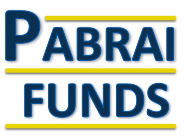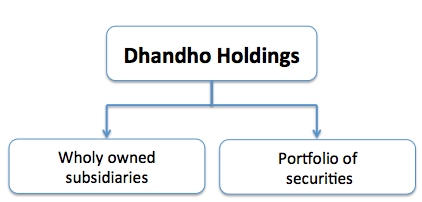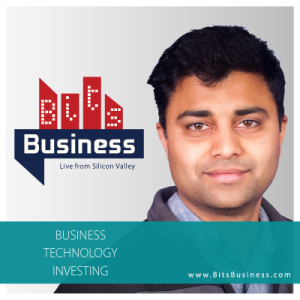Pabrai Investment Funds Annual Meeting Notes – 2014
— September 21, 2014Fund Facts :
- Mohnish Pabrai is the principle investor and is a classic value investor in the tradition of Warren Buffett and Charlie Munger
- Pabari Funds ( PF1 through 4 ) have a combined capital of $690 Million under management
- Inception : 2000
Value Proposition :
- No Leverage / No Margin / No Short Positions
- No management fees, only performance fees. ( typical expense ratio of Pabrai funds are between 0.04% to 0.08% )
- Pabrai family is the second largest investor.
Dhandho Holdings :
- Founded in Q4 2013
- Raised $152.4 Million
- Setup as a SPAC ( Special purpose acquisition vehicle )
- Flexible vehicle – Ability to buy and hold fully owned subsidiaries for long term and portfolio of stocks
- Time limit (sunset) to invest funds raised from investors in proposed investment (Stone Trust Insurance )
- Headquartered in Porte Rico – for tax benefits
- First acquisition : Stone Trust Insurance
- Proposed date for IPO : 2015
Stone Trust Insurance – quick facts :
- Mutual insurance company with 5000+ policy holders
- Primarily into workers comp insurance
- Serving five starts in U.S in 2014 ( expected to expand to ten or fifteen stats in ten years )
- Earned $70 million in annual premium ( compared to $20 million in premiums in 2009 and $10 million in premiums 2004 )
- Expect combined ratio of 95 or lower over long term
- Dandho Holdings will infuse a capital of $30 million after acquiring Stone Trust Insurance for $35 million
Dhandho + Stone Trust Advantage :
- Dhandho’s cash surplus and backing will allow Stone Trust Insurance to grow without capital constraints.
- Boost’s Stone Trust’s credit rating from B+ to A- post acquisition
- Single investor ( Mohnish Pabrai himself ) managing investments for Stone Trust ( Clone of Buffet’s model for Berkshire )
- Environment where the focus is on under writing discipline and not growth
- Dhandho will provide a non-institutional environment, which is important for success in insurance business
Listen to my interview with Preston Pysh and Stig Brodersen on “theinvestorspodcast.com” on Mohnish Pabrai and the 2014 annual meeting.
Q&A :
(Q) Why did you invest in Chesapeake Energy and what were your reasons to exit ?
Historically based on an energy equivalent basis, crude oil and natural gas prices should have a 6 to 1 ratio. However in the recent years the price of oil typically had traded 8-12x that of natural gas due to a combination of rising domestic production from unconventional shale gas and regulation of natural gas export from U.S depressing price levels and fear premium for the global crude oil prices.
Chesapeake Energy ‘s stock price had hit a low under the leadership of Aubrey McClendon due to unsustainable expansion and spending. Aubrey ran into financial and ethical trouble and was ousted by the board of directors
Chesapeake Energy was going through a change in management with the appointment of Doug Lawler as CEO and election of Carl Icon and Lou Simpson to the board. Doug Lawler had started to bring spending discipline and focus the company on it’s core business.
My expectations and assumptions when I invested in Chesapeake Energy were :
- The core business had great underlying assets
- There are few shale formation in U.S and there is less possibility of discovering new shale formations
- In the long run Natural Gas will do better and there is a high probability that 6:1 ratio between crude oil prices and natural gas are restored.
- The U.S govt will be lobbied by European countries to allow Natural Gas exports from U.S ( Though I was not counting on that )
- The new management will bring back spending discipline and profitability
Though I still believe in the long term prospects for Natural Gan and Chesapeake Energy, It did not meet all my expectations. When I found a better opportunity to invest capital, I decided to exit Chesapeake Energy.
(Q) Are Dividends an important part of your investment decisions ?
Owners Earnings and the quality of the earnings are more important than dividends in my investment decision. One should look at the big picture instead of focusing on yield or dividends.if done right, Share buy backs are more efficient and beneficial to share holders than dividends,
(Q) Why change of heart on India ?
Note : This question was in relation to Mohnish’s recent investments in India, which had avoided thus far.
I had stayed away from India as most of the companies tend to be family owned and lots of them have governance issues and hence we didn’t prefer to invest in family controlled businesses.However, we found few opportunities this year, which fit our criteria. One of them is The South Indian Bank.
Why South Indian Bank –
- Unlike west or U.S it’s hard to get a banking license in India
- 60% of the country still don’t have a bank account
- Growing middle class are embracing banking and opening bank accounts
- It’s not a family owned business
(Q) On re-entry into POSCO
- Posco has derived its highly efficient manufacturing process for steel and iron from Nippon Steep, Japan in early 1960’s
- Even though Korea has no raw material for steel, due to highly reliable and low cost sea transportation, Posco has developed a strong competitive advantage
- Steel business is cyclical and almost all steel companies have losses at one time or another, however Posco has never lost money
- Posco has strong support of the South Korean government.
- South korean culture and work ethic is also a strong advantage
(Q) How has your process of investment selection changed over time ?
- Over time i have realized it’s better to be a cloner than to think of original investment ideas.
- Using a checklist before making an investment keeps me safe from biases and overconfidence.
(Q) Have you changed your philosophy of portfolio allocation from diversification to concentration over time ?
My approach or philosophy depends on the availability of investment opportunities. in 2008-09 there were many opportunities and one could have a diversified portfolio with less than 2-3% allocated to each investment. In the current environment it’s hard to find many opportunities and hence I have changed my allocation to be lean towards concentration.
(Q) How do you know if an investment is within your circle of competence and how far to the edge are you willing to go ?
If a business is in your circle of competence, you should be able to think like the owner or CEO of the business, which would mean you are able to identify the key metrics or factors that really makes or breaks a business.
I try to stay towards the center of my circle of competence and would rather not test the edges.
(Q) How do you read annual reports of tech companies like Google ?
I had read the S1 document which Larry Page had written about his vision for Google. It’s important to read the management discussions in the annual reports over the years to get the big picture and understand how the management has executed on it’s vision.
Summarize your investment thesis in a single paragraph and monitor it. If you can’t do that then you can’t own the stock. Do not read the annual report blindly and read it by asking questions.
Based on your research you should be able to extrapolate the range of outcomes for a business in the future.
Questions related to Dhandho Holdings
(Q) Recommended Books / Publications on Insurance ?
- The Davis Dynasty: 50 Years of Successful Investing on Wall Street
- The Essays of Warren Buffett: Lessons for Corporate America, Third Edition
- Anatomy of a good insurance company in Berkshire Hathaway annual report 2004
- Yellow book filings of insurance companies
(Q) What kind of companies will Dhandho invest in ?
Dhandho will own relatively small and entrepreneurial companies
(Q) What is the difference between investing in public markets and investing in private companies ( i.e. Negotiated Vs Non-Negotiated ) ?
Public markets offer bargains for a shrewd investor due to many factors including unintelligent / uninformed investors and market forces
In private markets you pay up for a quality business run by quality management, however private acquisitions can be highly profitable in the long term if the acquirer can add value to the earning power or moat of the acquired business.
(Q) How do you intend to setup right incentives at the Stone Trust Insurance ?
Tim (Timothy W. Dietrich) is a great partner to have and will continue to lead Stone Trust. He works hard to be over reserved and profitable on underwriting. He need not work for a living, however he is passionate about his work and Stone Trust.
I proposed a compensation to include 10% of under writing profits and it took him less than few seconds to agree.
To conclude my philosophy about compensation is that “Humans work for a cause and something they believe in and not just for the love of money”.
(Q) Will Pabrai Funds buy shares of Dhandho when it goes public ?
When I invest capital for Pabrai funds, Dhandho Holdings will be one among the many opportunities available at that time. The decision to buy Dhandho will be based on the price and its valuation at that time.



13 Comments
Hari… I just attended Dhandho’s Rosemont mtg. Your post is exceptionally helpful, thank you! George
Thanks for your kind words George. I am glad you found the post helpful
Hari, exceptional post. Sorry I couldn’t make it with you. He really sounds like an up and rising star that’s going to be a key player in the future. Fantastic answers. Did he say anything about how he thought this low interest rate environment might play out? I mean it’s a horrible time right now because both the equity and bond market has no deals.
Thanks Preston, He did not talk specifically about the low interest rate environment but he did talk about the investment options available now, and according to him it has reduced to few moderately attractive options and hence he has started exploring investments outside U.S recently
Yeah I completely agree. Very interesting guy!
Thank you for your great notes Hari!
I can’t wait to see what is happening with the IPO in 2015. The research I have made so far about Mr. Pabrai has turned out very positive. Though I am by definition very cautious about IPO, this is one I would follow closely.
Thank you for posting Meeting Notes it. I posted the link at CofBand F message board.
Hari- thanks for sharing. In previous years, Mohnish has posted transcripts of his annual meetings on pabraifunds.com. Do you know why he hasn’t posted the transcript this year?
Anytime Mike, thanks for visiting my blog. I don’t know why Mohnish has not posted his transcript this year. I am glad I took notes though
Hi Hari,
Do you know when Danho Holding might go IPO this year?
What month, and which exchange?
Thanks.
Hi Switesh,
Dandho Holdings will most likely IPO by end of this year. Most likely after October if I remember correct. It will go IPO in U.S
Thanks
Hari
Hi Hari,
Did you attend the Pabrai Annual Meeting this pass weekend? If so will you be writing another summary of what was presented? I look forward to reading anything you have to share.
Thank You,
Bennie
Bennie, thanks for the note. I have published my notes from Pabrai annual meeting this year